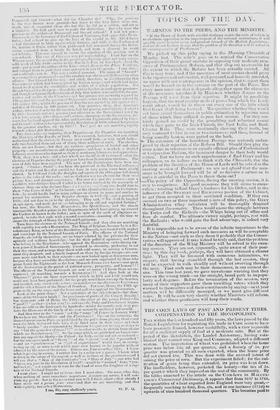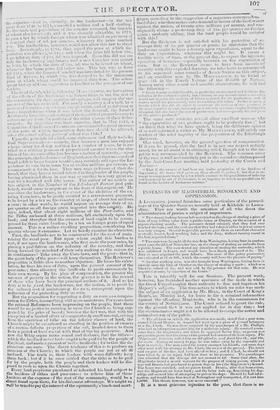THE CORN LAWS OF PAST AND PRESENT TIMES. COM PEN
S ATION TO TILE MONOPOLISTS.
Ti Lt. within the lest hundred and fifty years, the laws passed by the British Legislature for regulating the trade in Corn seem to have been generally framed, however unskilfully, with a view to provide for all a sufficient supply of food at a moderate rate. But at the period of the Revolution, the Landed Aristocracy, having esta- blished their control over King and Commons, adopted a different system. The importation ot' wheat was prohibited when the home price was below 53s. 4d. per quarter, and a bounty of Ss. per quarter was granted on all corn exported, when the home price did not exceed 48s. This was done with the avowed intent of raising the price of corn. But the experiment failed; for the cul- ti‘ation of grain being thus extended, its price was kept down. The landholders, however, pocketed the bounty—the tax of 5s. per quarter which they imposed on the rest of the community. By the tables annexed to the article on the Corn-laws in MAccut- Loelfs Commercial Dictionary, it appears that from 1697 to 1766, the quantities of wheat exported from England were very great,— frequently reaching to four, five, six, and in one instance (1750) to upwards of nine hundred thousand quarters. The bounties paid to
- the exporter—tliat is, virtually, to the hualowner—in the tea
i.1- from 17-lb to lia 1, exceeded a million and a half' sterling. yes s ' As the natio and poaalatioa of the country increased, the imports of wheat also inieteseil; and it was thought advisable, in 1773, ;, to pass a law by which foreign wheat was admitted on payment of a euminal dute of O. per (platter, alien:a-yr the price reached : 4,es. The ialefaoldess, however, would not allow this law to stand
's long. Accordiugly, ia 1791, they raised the price at which ins-
11I1. . - - • •, realm was allow 0 ' to .53v.; and when the price fell below 50N., , a prohibitory duty ,,i. 2-1s. 3d. was imposed. Even this did not sit- ' listv the latalowiatig legislators; and a new Cora-law was passed in ls 04, by which the duty of e-la. ad. was to be levied on wheat, . wheutemr the home Nice fall Iselow tiffs. This law wee it) force till i sir), w hen the fanteuet4orn-bill was introduced les the present Earl it :Biros:a, by which sess. was &mated to be the minimum rive at which wheat (mull be :imitated duty-free. The subse- quent histsry of Corn leg:elation is fieniliar to the youegest of our readers. The brief sketch, \\ h'; il dhow ing I.1('C'I`I.I.00tr, WC have given of ties efforts of the la wit AV lie: e it: forteer times to tax the rest of the ceettnunity for itilH 1:: etiliai* Mhailtage, 1'.' ill suggest OW vast amtane of the tas s , 1, . is 1. !as. imarly a century mai a half, by a stseeo ef Lanai,- : :: • i v. lee: s. as )tiful, and of prohibition or boeit v itopertele, 1, s i en it min, boa s. the demand, the Landed A ristocree s has e • s :- . . , ol yenta :mot their political preponderance to eetssee neoetov fess ,' e pickets of the other CaSSCS of their fellow subjects. So be e ' a as was their rapaviiy, that in May 1513, a Commi i tee of the 1 ,,:a • e ef Ct melons recommended a great increase of the price at v.h1toli itaaorta lien duty-free should be allowed, ?diec the aetual sclliag pi.i,-e ( f wheat was I 1.2s.! I: pott the pi ineiple in which some stutestnen and their tools de- fend Superammittiees---namely, that because a man has enjoyed a large salary Or tieing nothing for a Lumber of sears, he is en- titled to a retiring pension of proportional :amount when the abo- lition of his siovaeure talice has become: a :natter of necessity,—upon this principle, the tat:downers alai ig`and, now that their neempuly of bread is felt to be 110 longer tenable, may certainly call upua the Le- gislature to sate them some tea or twelve millions per annum, as a compensati-n for its loss. They may urge in favour of their de- mand, that they have a vested interest in the plunder of the people, having plundered them in one way or another to a very great ex- tent air a hundred and fifty years. The author of an article on this subject, in the Number of the Ldinlaugh Review just pub- lished, would seem to acquiesce in the flece of this argument. He considers the landowners, in the event of the abolitioa of the ex- isting Corn-laws, to be justly entitled to a reversionary payment, to be levied by a tax on the country at large, of about ten millions a year; in other words, he would impose an average duty of es. per quarter on all foreign grain imported into this couptry. He says, indeed, that about eight millions of the Poor-rates, and the Tithes reckoned at three millions, fall exclusively upon the land; and therefore that the owners of land ought to be recom- pensed for these extra burdens, by a tax on foreign grain of equal amount. This is a rather startling proposition, considering the quarter whence it emanates. Let us briefly examine its character. First, the landlords are to be remunerated for the cost of main taming the rural poor. But upon whom ought this burden to rest, if not upon the landowners, who first make the poor-rates, by placing .a prohibition on the industry of the country, and then bring forward the mischief of their own making as the reason for its continuance? Take away the Corn-laws, and the poor—that is, the great body of the poor—will keep themselves. The Reviewer's proposition is liable also to another objection. He bases his calcu- lation, he fixes his rate of duty, upon the present amount of the poor-rates ; tints allowing the landlords to profit enornmusly by their own wrong. By his plan of compensation, the greater the amount of poverty in the nation, the greater is to be the reward of those, who have been the principal authors of it. And as his duts is to be fixed, the landowner, not the nation, is to profit by the reduced cost of maintaining the poor, consequent upon the reduction of the protecting duty on corn.
But the proposition for supporting a duty on corn as a compea-
sation for Tithes, is something still more monstrous. For years have the rational Reformers been impressing on the people, that there would be no justice it) running in upon the Church as being sup- portel by the price of bread; because the fact was, that with the excep: ion of' a limited etrect of comparatively small amount, arising from the operation of tithe on the inferior classes of land, the Church might be considered as standing in the position of owners of a certain definite proportion of the soil, banded down to them from a period at least coeval with that of the lay proprietor. And now the Whig organ turns round and declares, that the tithes— which the landked never had—ought to be paid for by the people of Flighted, and made a present of' to the landlords ; fin. to this the de- claration amsunts. The direct tendency of this is to produce an inthsion of the Church; to which the people are not at all ill inclined. The truth is, their leaders with sense difficulty keep them hack; but if it be once eettled that the tithe is to be paid for by the people, both the people and their leaders will be dis- gages, aceosdieg to the suggestion of a sagacious correspondent, . the G lobe ; who thus makes out a demand in favour of the landowners against the nation, of twenty-nine millions 1:er annum, and con- sequently claims a protecting-duty if 16i. per quarter on foreign grain ; modestly adding, that the land people would be satiOed with this!
But the Resiewer is not satiodied with his protection of an average duty of as per quarter on grain; he maintains that the landowner ought to have a bounty upon etportation, equal to the duty on importation, Nvliatever that might be. It seems a terrible waste of time, at the present day, to expose the initmuna operation of bounties—especially bounties on the exportation of corn. But us the Reviewer seems to have been inoculaied recently' with this exploded doctrine, we take leave to recommend to his repetusal some remarks of Alias' SMITH on this subject, awl an excellent note by Mr. Mace Li shot it, to be- et page 135 in the Fourth Volume of the Wealth r 2l"ati.ms. Among many other sound and sensible obsenations, he will find the following- " leery bounty is olijectionable, is prorlueing an unnatural and fit iii trihntion of the national capital ; but a bounty on ton' manufactured r,anelodiry will not imaease the livantity of labour required for its production, and, /*,1 course, would not pro inammtly raise its exchangeable value. In this rr-peLt, biota!, which has .14 its oi:het 1.110071 ra Meiuisiiq 1!I row p Wilier, is Mc most impati■ le "I' nay, inasmuch as it Mit only occasions a faulty dist ribut ion of capital, hot also raises the cost of production, and consequently the real priee of the artirl,s prodireed."
The same note contains sesanal other excellent reaatins
" the exportation of raw pruduee ought to be perfectly. free but
we think that what we have quoted, being the deliberate opittion of so wellatolbrined a writer as Mr. Mac:eel:1.0CH, will satisfy our readers of the utter itopoliey of the proposition of the Edinburgh Reviewer.
(Le word, however, on the general question of compensation. If it can be proved, that the land is in any one respect unfairly taxed, let us all assist it in obtaining relief, though not in the im- politic way recommended by the Reviewer. The common sense of the case is well and concisely put in the second resolution passed by the Anti-Corn-Law meeting held yesterday at the Crown and Anchor- " That if the owners of land bear any undue proportion of the burdens of Haw mono y, Hue taxos Mot pruss on Mon shonhl i, p educed ; but that to at- tempt to compensate them by it tax which amounts to the prohibit' of industry and commerce by act of Parinunent, is an impolicy to which no parallel can be found ILl the history of barbarous nations."



















 Previous page
Previous page